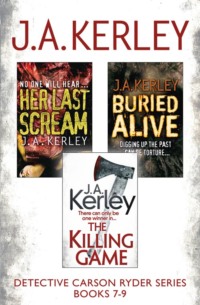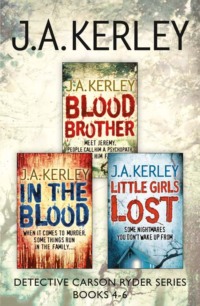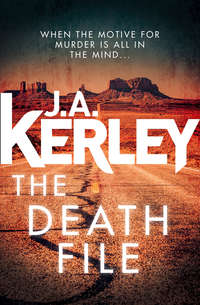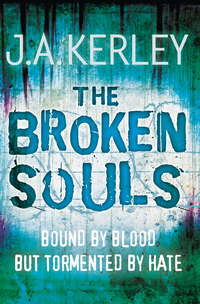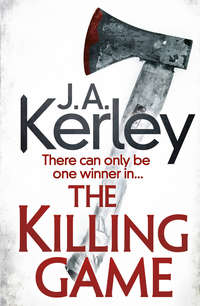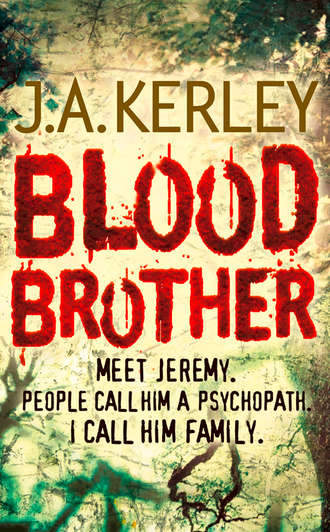
Полная версия
Blood Brother
“You realize our perp hates women, right? More than anything?”
He nodded. “By removing the womb, he castrated her. I’ve seen my share of gender kills, though nothing quite that extreme.”
“Shelly, you’ve got a real nightmare brewing out there.”
Waltz’s phone rang. He grabbed it up. I turned my eyes away and pretended not to listen but, like everyone in the world, cops especially, kept an ear tuned to his voice.
“I’m in the middle of a …She’s in town? The Chief wants me specifically? No, I can do it. I’ve got to do it, right? Listen, we have a guy here, a specialist in, uh, people with bad intentions. OK to bring him along? Good. We’re heading there now.”
He hung up. “I know you heard that, Detective. I’d be disappointed if you hadn’t.”
“I take it we’re going somewhere?”
“There’s a political convention in a week or so, women from around the country, leadership types. I’m supposed to vet the threats, determine which are hot air, which are truly dangerous.”
“Threats?”
“The keynote speaker is Cynthia Pelham.”
“Holy shit,” I whispered. Cynthia Pelham had been on the American political scene for over twenty-five years. Her saga started at age twenty-three, when the county sweet-potato queen with two years of junior college married a fifty-eight-year-old senator from Georgia.
By thirty, she was making statements contrary to the senator’s positions regarding women’s right to equal pay and maternity leave. She had three-fourths of a law degree, obtained at night, since she’d had to spend her days on the senator’s arm and smiling the sweet-potato smile at cameras.
By thirty-five, she had the degree, but not the senator. Following a high-profile divorce, the senator’s allies, of whom there were many, spread rumors that Cynthia Pelham was – depending on the day and rumormonger – a lesbian, a woman who bedded every man she saw, frigid, a drug addict, a drunkard and, according to the New York Watcher, maybe even an extraterrestrial. Ms Pelham’s friends, of whom there were few at that time, simply said, “She grew up.”
By forty, Pelham was representing a mainly poor congressional district with such concern and passion she was uncontested in the next election. Since she was unmarried, held centrist feminist ideals, and kept her personal life personal, rumors of lesbianism persisted, her denials met with scorn. Websites and blogs sprang up calling for either her vilification or beatification.
By fifty-two, her present age, she had been convinced by grass-roots support and a generous helping of ambition – never denied – to run for President of the United States. Though bitterly divisive among partisans and ideologues, she wielded enough centrist appeal that odds were even money she’d win.
A few nights back I’d seen news from a typical Pelham event in Miami. Three-quarters of the crowd were supporters, the others ranting, waving fists, and carrying signs and posters. One showed a mangy female dog with bloated teats, Pelham’s face in place of the dog head. The caption said, “Time to Put the Bitch to Sleep.”
I said, “How long will Pelham be here, Shelly?”
“She’s coming to coordinate the eastern seaboard campaigns. The lady will be in and out of town all the next week.”
“What about the Secret Service?”
“They’ll accompany Pelham while we vet everything else.”
“‘We’ meaning you?”
“Basic security isn’t my problem, a special team handles the bodyguard routine, checking traffic routes and so forth.” He sighed. “The Chief wants me to explain to Ms Pelham’s handlers how the NYPD will keep snakes from wriggling under her door.”
I nodded my sympathy. Given Pelham’s flashpoint index it would take someone with experience to determine which threats were hot air and which were dangerous. It was nasty work, like dredging sewage with your fingers.
Waltz stood and grabbed his hat. “Like you heard, I bartered you into the mix. Straighten your tie and let’s get running.”
The powwow was at Ms Pelham’s NYC headquarters, a storefront near Cooper Union. There were the usual banners and posters and photos of the candidate. The desks were staffed by earnest-looking folks with phones in one hand, pencils in the other.
We met in a back room with Ronald Banks, a square, bespectacled African-American Secret Service agent in charge of the operation. I took the room to be a place for strategizing, a large map of NYC on the wall, broken down into precincts, voting registrations or projections sticky-taped to the map. There was a round table, a few chairs. Boxes of campaign flyers on the floor.
“She getting many threats?” Waltz asked Banks.
“People love her or hate her. The ones who hate her all seem to have rabies. Good luck, Detective Waltz.”
Our heads turned to a commotion in the work area: Cheers, applause, whistles. Either someone was dispensing free money, or the candidate was visiting. Three minutes later, Cynthia Pelham entered our room, two aides de camp in her slipstream. Somewhere along the road the sweet-potato queen had been replaced by a whirlwind in a pantsuit and sensible shoes. She ran to a corner, cellphone to one ear, finger in the other, talking as loud as if she were alone for miles around.
“Dammit, I don’t care how much money he has, the sonuvabitch is trailing garbage. The day after we take his donation the bastard will be indicted for screwing a goat or something. See if you can piss him off and maybe he’ll give the money to the other side …”
The second she snapped the phone closed it rang again. She listened for a ten-count. “The answers are, respectively, Yes, Yes, No, Hell yes, and the lobster bisque.” She switched the phone off and tossed it to a woman beside her, a petite blonde with quiet eyes and a square jaw who tucked the phone in a fat briefcase I figured doubled as the candidate’s purse.
The sweet-potato queen had turned from a pretty girl into a handsome woman, auburn hair now mixed with gray, her form shaded to the heavier side, skin lined with experience. The eyes that looked piercing on television seemed more curious in real life. She aimed the eyes at Waltz and me, moved to us as if pulled by gravity.
“You gentlemen look official. Am I triple-parked again?”
Waltz did his best to make his sad face smile. It looked like he was fighting a sneeze. “We’re here because a lot of folks don’t like you, Congresswoman. Men especially. At least that’s what I hear on the news.”
Pelham laughed, hearty and deep and bordering on bawdy. Unlike many candidates, she wasn’t afraid laughter would mark her as more human than machine, therefore unfit for high office.
“A lot of ladies don’t like me either. Hell, a lot of people’s pets don’t like me, if I’m to believe my mail.”
“You do seem to seriously set some folks off,” I said.
She raised an eyebrow at my voice, then the eyes went serious. “A lot of politicians get hate mail from people who live under rocks, but mine seems to come from the people beneath the people under the rocks. I showed a few letters to Rich Stanzaro when we were primary opponents. He said, ‘I see some strange shit, Cyn, but no one ever wants to cut my tits off.’”
“Rabies, like I said,” Banks noted to Waltz.
Pelham turned the curious eyes to me. “You’re the first NYPD cop I’ve ever met with a Southern accent.” She raised an eyebrow and grinned. “South Bronx, maybe?”
“I’m with the police department in Mobile, ma’am. I’m consulting on another case and Detective Waltz thought I might have a useful insight or two.”
“Because you’ve done something like this before? Helped guard against the angry people?”
“In a way. Back in Mobile I’m part of a unit that deals with mentally unstable criminals.”
“How unstable?”
“They’d not only cut your tits off, ma’am, they’d bread ‘em and fry ‘em up for supper.”
Eyes widened around us. Even Waltz raised an eyebrow. There was a moment of silence before the congresswoman barked the laugh, slapped my shoulder.
“I’m glad they sent out for Southern cooking, hon. You got some pepper in your gravy.”
Pelham shot us either a peace or victory sign and scurried off to pump up the cheerleader section out front. I stayed quiet as Waltz explained to aides and senior staff how he’d be checking the hate mail and unsavory phone calls, cautioning everyone to stay alert for strange people, incidents, and items in the mail.
The whole trip to and from Pelham’s HQ took under an hour. Cargyle, the young guy from Technical Services, ran across the floor as we returned to the detectives’ room, excitement in his voice and a tape cassette in his hand.
“Dr Prowse’s arrival was caught on security cameras at LaGuardia. I found two sections when she’s on camera. The first is by the baggage carousel, the second is going out the door. She seems normal, picking up her bag, heading out to grab a cab. She talks to a man beside her for a second. Probably small talk with another passenger.”
“Folger and her crew in?” Waltz asked.
“Due back shortly, but I don’t know exactly when.”
“Let’s get a preview.”
Cargyle wheeled a playback system into a conference room. He had a bag of tools and tape and electronic doohickeys slung over his skinny shoulder. His wristwatch had more buttons than my truck’s dashboard. He had not one but two skinny telephones. If Cargyle was like our Tech Services crew in Mobile, he read schematics instead of books.
“You just now find the footage?” I asked him.
“I’ve been at LaGuardia all night. Found one image at three, the other a half hour ago.”
“There all night, here all day? You ever sleep, buddy?”
Waltz said, “Cargyle’s assigned to the precinct, his training phase. I’m making sure he gets the full learning experience.”
“Full and more,” Cargyle grinned. The tape stuttered into action. The quality was better than your standard convenience-store cameras and I figured Homeland Security had a bigger budget than the Gas‘n’Gulp.
“Here’s the first segment,” Cargyle announced. “By the baggage carousel.”
I held my breath as Vangie stepped into the frame, flight bag over her shoulder. She ran to the carousel and snatched her suitcase. She paused, then spoke to a white-shirted man beside her, slender, facing away. The scene lasted all of five seconds.
“That’s snippet number one,” Cargyle said. “The second is a couple of seconds longer, but not much.”
The edited video jumped to the next scene. The camera was positioned above the door, the crowd herding tight for the exit like cattle down a chute.
“Here she comes,” Waltz whispered, picking Vangie from the on-rushing mob while she was still a blur. I leaned close to the screen. It took a second to discern the familiar features, the large eyes, dark and compact hair, rosebud lips. The eyes looked wary and tight with tension as Vangie exited the terminal with the slender man by her side, his head again canted away. At the last moment, he snapped his face toward the camera. His grin was ecstatic, his joy dominating the screen.
My spine turned to ice. I couldn’t choke back a gasp.
“What?” Waltz said. “You know him?”
“I’ve seen him before,” I whispered. “He’s a patient at the Institute. Brilliant and murderous and unpredictable.”
I didn’t add that he was my brother.
FIVE
“The crazy’s name is what?” Folger asked.
“Jeremy Ridgecliff,” Waltz said. “He killed his father when he was sixteen, then brutally murdered five women. Ridgecliff has been in the Alabama Institute for Aberrational Behavior for over a dozen years.”
Folger turned to me. “Didn’t you say they never got out of that place?”
I barely heard her and made no response. I sat in the corner, stunned. Somehow, Jeremy had escaped and forced Vangie to New York. Vangie was dead, mercilessly and bizarrely mutilated by my brother.
Tell them, my mind said. Tell them he’s your brother. You’ve got to tell them now.
I opened my mouth to speak as Waltz waved everyone silent, holding up pages fresh from the fax machine. “Our first look at Ridgecliff. He likes knives, mutilation and symbolism. And he’s had years of incarceration to dream up new stuff. That’s the good news.”
A detective in the back of the room, Perlstein, looked up from his note-taking. “If that’s good, Shelly, what’s bad?”
“He has a higher IQ than anyone in this room, I’d wager. I’m talking maybe thirty points higher.”
Low whistles, groans. A killer with creative intelligence could be as elusive as a black shark in a midnight ocean.
Stand up and tell them, my mind repeated. They’re cops. You’re a cop.
Folger’s heels ticked on the floor as she paced. “Ridgecliff somehow coerced the Prowse woman into bringing him here, then killed her, no longer needed. What he did to her got him so juiced he had to do it again. Like Waltz said, this monster’s had years to let his fantasies cook. His feet barely hit pavement and we’ve got two women torn to bits.”
What would happen when I told them? I’d become their information machine, held distant from the investigation, used but not completely trusted. It was the smart thing to do. It’s what I would do in the same situation.
Waltz’s voice broke into my thoughts. “It was Detective Ryder who ID’d Ridgecliff, saving hundreds of man-hours. We all owe him a debt of gratitude.”
My face burned as the other faces in the room turned to me. Cop faces, my brethren, nodding thanks at me. I heard scattered handclaps. Folger walked over.
Tell her.
“Job well done, Detective. Waltz is right. We all owe you one.”
“Listen, Lieutenant, uh, I’d like to tell you about Ridgecliff. He’s –”
Folger’s hand, firm and cool, found its way into mine. “Sorry we got off on the wrong foot. You know how protective departments are about turf, right? You can head home and we’ll have Ridgecliff nailed in a day or two. Drop him back in the box. Or even better, lay him in the ground.”
“Bang,” Bullard said. “Problem solved.”
“Uh, listen, Lieutenant …”
But what if …What would change if …I said nothing. What was affected as long as I stayed near the investigation? Vangie could have mentioned Jeremy was my brother. Why didn’t she?
“Yes?” Folger said, a dark eyebrow raised.
“About Jeremy Ridgecliff …I’m part of a special unit that handles the edgy stuff, psychotics, sociopaths. I can help you more than you think.”
“We have homicidal crazies in New York, Ryder. I think the NYPD can handle –”
Waltz interrupted. “You recognized Ridgecliff right off the bat, Detective Ryder. Am I to assume you studied the suspect?”
I kept my face neutral and my voice even. “I have had conversations with Mr Ridgecliff. Quite a few, actually.”
Waltz turned to Folger. “Not only does Detective Ryder know a bit about Ridgecliff, it might speed up communication with Southern law enforcement if we had a liaison. And a local professional to interview the staff at the Institute.” Waltz looked to me. “You can handle the Southern pipeline on both counts, Detective Ryder?”
Though my heart was pounding like a hammer, I kept my voice nonchalant. “I have excellent contacts in the Alabama State Police and can have my partner handle interviews at the Institute. He’s experienced in psychological crimes.”
Folger said, “I don’t think we need –”
Waltz clapped his hands once, not applause, but finality. “That should settle things and sit well with the brass. Detective Ryder will be with us a few days longer. A consultant, if you will.”
Don’t go down this road. Tell them now. It’s your last chance.
I studied my shoes. My mouth stayed closed.
What am I doing?
Folger departed briskly, Bullard and Cluff on her heels. Waltz headed to a meeting with the DA on another case. I stood on unsteady legs and checked my watch: Ten thirty a.m. It was an hour earlier in Mobile. I blotted sweat from my forehead with my sleeve, took a deep breath and dialed my cellphone. Twelve hundred miles away in Mobile, my partner, Harry Nautilus, picked up.
“Cars? Jeez, what the hell’s going on? Are you still in NYC?”
I pictured Harry frowning into the phone, a six-four black man in a forty-eight long jacket, probably yellow or neon green. The pants might be plum, or mauve. Harry loved color and no one dared tell him it sometimes didn’t love him back.
“I’ll be here for a few days, Harry.”
“Why? I mean, one minute you’re here, the next you’re –”
“Jeremy escaped,” I said. “He’s in New York.”
“What?”
“He somehow coerced Vangie Prowse into bringing him here. Vangie’s dead, Harry. Jeremy killed her and another woman. He did terrible things to the bodies. He’s exploding.”
“Lord Jesus,” Harry whispered. “How in the hell did he get out?”
“I don’t know. Some kind of ruse. Maybe he got hold of a weapon, or found some security failing. It should have been impossible, but he did it. Listen, Harry, I know the State Police will be handling it, but could you take a look at the Institute, find out how –”
“Did you tell them, Cars? Did you tell them he’s your brother?”
I couldn’t find my breath. The day seemed to come crashing in and my eyes filled with tears. I gasped, wiped my face on my shoulder. Waited for Harry to tear into me, to tell me I was an idiot. Or worse.
Instead, Harry said, “Tell me what you need me to do, bro.”
We talked for a few minutes. After hanging up, I slunk toward the exit carrying a paper bag bulging with copies of the files faxed to Waltz by the Alabama State Police. On the way out I saw Alice Folger in a shadowy meeting room by herself, watching a television like something major depended on the outcome. I couldn’t see the screen or hear the audio, and wondered if it was a news program with NYPD featured in some way, or perhaps a verdict on a case she’d worked.
I crept by to the other side of the hall, shot a glance at the TV screen. I saw a suited man pointing at colored lines bisecting the nation’s midsection.
Alice Folger was hypnotized by the Weather Channel?
SIX
I returned to the hotel and set the files on the table, pushing them to the far side. Guilt at my inability to tell the cops the truth pooled in my guts like cold oil. There was more to feel guilty about: Even though a specialist in psychological crimes, I had never read the details of my brother’s murders. I had always feared that, in reading the cold facts of Jeremy’s cases, I might see a monster, and not the tormented child who killed his father after years of unspeakable misery …
I am just past my tenth birthday. Jeremy is sixteen. One day, playing alone in one of the forts Jeremy and I built in the woods behind our house, I walk from the trees to find the county police at our house. There is a policeman on the dirt drive of our house, another at the wheel of the car. The cop in the drive is looking at my mother, three steps up on the porch. Jeremy is on the porch as well, sitting a dozen feet away in the glider. He looks between the policeman in the car and the one in the drive, his eyes pensive.
The policeman’s hat is off and he is holding it over his privates. He is tremendously old, fifty maybe. He removes his mirrored sunglasses, his face creased with sorrow. I hear his words in soft groupings.
“I’m so sorry, ma’am …
“The coroner’s there now, no need for you to see such a …
“We’ll find this madman, ma’am, this person …”
I look to the police car and see the second policeman through the open car door. Younger. He’s reloading one of those cameras where the film turns into pictures as you watch. He sets the camera aside and his eyes study me. Strangely ashamed, I look at the ground. When I look up again, he is studying Jeremy. Then the moment passes and the cops turn to dust in the hot air. My mother stands in the yard like a statue. Jeremy rocks the glider to and fro, a faraway smile on his face.
I had never asked Jeremy about the day our father died. I had hated the man. When he left for work in the morning, I watched the truck disappear down the road and prayed for his death. A retaining wall cave-in, crushed under a bulldozer, falling from a bridge. I had a dozen hopeful scenarios.
Please God, make him die today in a gasoline explosion …
Instead, it was my big brother who finally exploded. Only later, after interviewing a hundred fiercely dysfunctional minds, did I realize Jeremy’s explosion had saved me from an escalating madness destined to end in a house full of dead bodies with the standard news bites from the neighbors.
“We never knew the Ridgecliffs real good, but they seemed decent enough …Earl didn’t seem the kind of man to do that to his family and hisself …it’s a tragedy, is what it is …”
Jeremy knew how it would end, and took the only course he could take. I am alive because my father never got the chance to kill me.
Every breath I take is a gift from Jeremy.
I arrayed Jeremy’s files before me in chronological order, starting with paperwork generated the day my father died. One of the first officers at the scene was Jim Day of the county police. Though higher-ranking officers had been in early attendance – Sergeant Willis Farnsworth, Lieutenant Merle Baines, Captain Hollis Reamy – it was Day who wrote up the report. It may have been that Farnsworth, Baines and Reamy wanted to avoid paperwork, not unusual for guys with the rank to lay the work on others; but it could also have been Day’s eye for minutiae and vocabulary for description.
Victim’s intestine, Day wrote, appeared to have been severed at lower end and pulled like rope from the slit in victim’s abdomen. This “rope” extended across the ground for a dozen feet. And later in the report: A kidney appears to have been thrown with great force into a tree, bursting like a water balloon. Fragments were on the ground at the tree’s base.
And near the conclusion of the report, Day noted that, “the scene seemed one of total anger. The feeling was of a threshold crossed, some form of decision acted on.”
It took an hour to read Jim Day’s details and descriptions. When finished, I was soaked in sweat and my hands shook, forced to experience the crime as it unfolded. I’d heard the screams for mercy, smelled the cut-copper reek of flowing blood. My mind’s-eye watched my brother cut my father apart with a knife I’d used to slice bologna.
I blotted sweat from my brow and pushed aside the six-inch-tall stack of copies generated by Jeremy’s remaining murders of the five innocent women. I’d get to them later.
Tomorrow for sure.
Twilight painted the air a clean and fragile blue as Jeremy Ridgecliff rode a subway car downtown. He was feigning sleep while shooting sidelong glances at his quarry, a pasty little man, fortyish and balding. He was dressed in khakis and a gray wool cardigan, and had wary, flickering eyes that often shot to the tattered briefcase locked beneath his arm.
Jeremy had spent the afternoon wandering in the library, never going too far from the Political Science stacks and the Archived Newspapers: Cheese for a very special kind of mouse.
Had he found one?
Jeremy had watched the man working in a carrel, muttering to himself and making notes. After an hour, the man exited the library cautiously, clutching the briefcase to his chest and jitter-stepping to the street, shooting glances over his shoulders.
Jeremy had followed, his antennae quivering.
The man had stopped at a cart for a sandwich. He opened the bread like it was booby-trapped, and inspected the interior. After wolfing the sandwich down, he’d skittered to the subway entrance. Jeremy slipped his Metro Pass from his pocket, followed the man into the ground.


